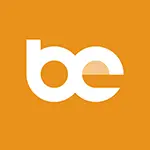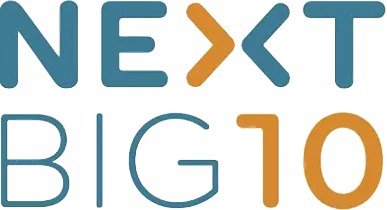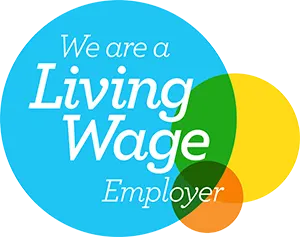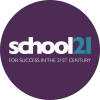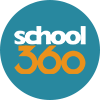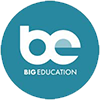As educators, our commitment to lifelong learning – I believe – is not only a personal endeavour but also a professional responsibility. Professional development in schools plays a pivotal role in enhancing our teaching skills, staying abreast of educational trends, and ultimately, contributing to the success of our students.
Working with a group of colleagues as part of the Next Big 10, I have been energised by collaborating with others who want to develop innovative education practices, and to shout louder about the possibility of doing education differently. Our specific focus as a working group has been around producing a set of guiding principles that drive the design of professional learning. After much reading, lengthy discussion and more than a little challenge, we decided that we already had the perfect principles – those that underpin the work of the Next Big 10 Project:
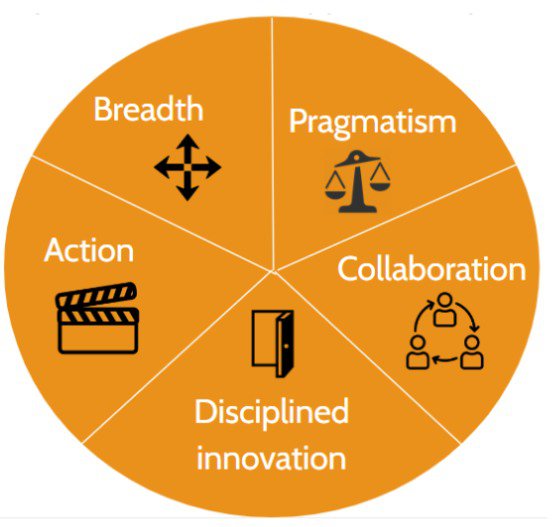
Katherine Reynolds from Ladybridge High is also a member of this group and has written an excellent blog about Ladybridge’s approach to professional learning. In this blog, I will go into a little more depth about how these principles may inform a successful professional learning provision in schools, providing a framework rather than a prescriptive model – something we all agreed was more empowering to enable schools to meet the needs of their own context.
1. Breadth: the Head, Heart and Hand
True professional development extends beyond the confines of a specific subject or key stage: embracing breadth in our learning journey means exploring diverse perspectives, methodologies, and educational philosophies; attending workshops, webinars, and conferences that span a wide spectrum of topics. Engaging with broader educational themes allows us to gain fresh insights and adapt innovative strategies from various disciplines into our own teaching practices. Breadth of knowledge not only enriches our teaching but also fosters a more interconnected and holistic approach to education. It encourages us to view our role as educators in a more comprehensive light, recognising the interconnectedness of various subjects and the real-world applications of our teachings.

Drawing on the work of the schools within the Big Education Trust, we decided that breadth in professional learning could helpfully be approached through a Head, Heart & Hand model. In line with these schools’ approaches to curriculum design, such a model allows for holistic processes and outcomes. Effective professional learning should provide a balance of the development of knowledge and character whilst providing opportunities for application and a high-quality product.
After deciding upon this as an important principle, we then identified four key areas for professional learning and developed guiding questions to enable school leaders to use as prompts when designing their offer.
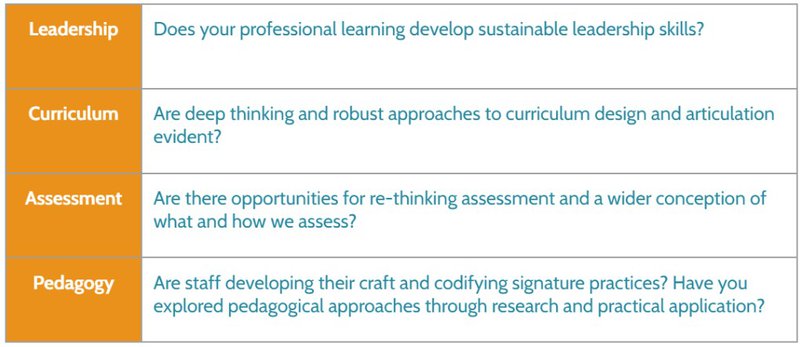
2. Pragmatism: balancing priorities to achieve meaningful application
The most effective professional development is rooted in pragmatism – the ability to translate theoretical knowledge into practical applications within the classroom. Through our research and discussion, we agreed that high-quality professional development should provide opportunities that lead to actionable strategies, teaching tools, and resources that can be readily implemented in daily teaching practices. As educators, our time is precious – more so now than ever – and professional development should offer solutions that are not only innovative but also immediately applicable.
Professional learning in today’s high-pressured educational context must consider staff wellbeing and do so through a lens of what we have called ‘compassionate accountability’. There is no question that teachers and schools should be held to account. However, we firmly believe that a new paradigm is emerging where the most effective way is through working in partnership and with compassion as a compass.
Finally, the principle of pragmatism recognises that there should always be a balance struck between internal and external factors; between whole school priorities and the needs and passions of individual professionals.
The guided questions to support schools considering pragmatism in their design are below.
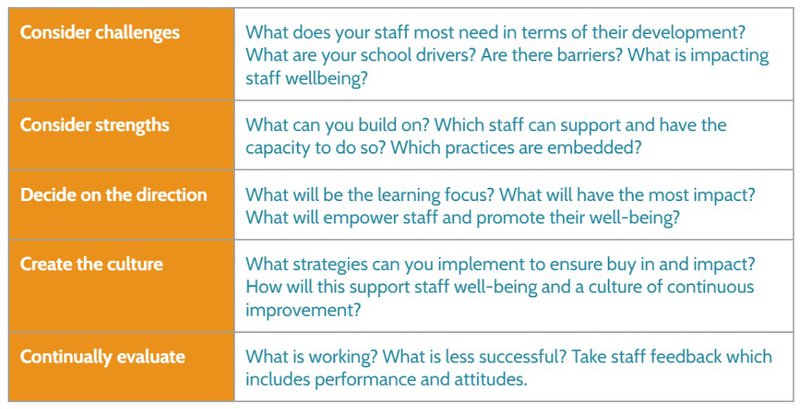
3. Disciplined innovation: balancing tradition and progress
Innovation is the lifeblood of education, but it must be approached with a disciplined mindset. Striking the right balance between traditional pedagogies and cutting-edge innovations is crucial. We urge schools to research evidence-based practices to provide a foundation for disciplined innovation in the classroom.
Disciplined innovation involves critically assessing new ideas and technologies to determine their practical applicability and impact on student learning. Professional development opportunities should guide educators in adopting innovative approaches while ensuring they align with the core principles of effective teaching.
For our group of like-minded colleagues, it is important that in relation to professional learning, active learning and experimentation are highly valued. There should also be opportunities for peer:peer collaboration through coaching, allowing for psychological safety and empowerment. The particular tools that we refer to have been developed by Big Education as part of their Big 8 leadership programme. These are foundational behaviours that can develop culture and ultimately achieve a ‘Big Education’ and, we strongly believe, a holistic approach to professional learning.
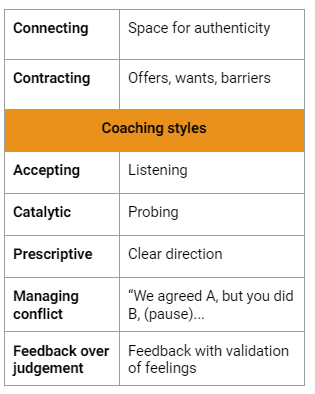
To support schools in embedding disciplined innovation in their professional learning, we came up with the following guiding questions:
- Do connecting activities build trust?
- Have colleagues agreed on a shared set of offers, wants and barriers?
- How can coaching protocols support innovative practices and risk taking?
- Are there strategies to support the creation of personal goal setting?
- Is there a shared understanding of how to give feedback and a shared language to do so?
4. Collaboration: the power of collective wisdom
The teaching profession is inherently collaborative, and professional development should mirror this reality. Collaboration extends beyond sharing lesson plans; it involves engaging in meaningful discussions, exchanging ideas, and collectively solving challenges. Seek out workshops and events that encourage collaboration among educators.
Professional learning communities, collaborative projects, and team-building activities during professional development sessions are essential components. When educators come together to share their experiences, expertise, and challenges, the collective wisdom of the group becomes a powerful resource for professional growth.
It is our strong belief that the exchange of ideas not only enriches individual professional development but also contributes to the overall improvement of a school's teaching practices. For us, collaboration in the realm of professional learning involves creating and sustaining a culture of mutual support and challenge. There should be an emphasis on sharing learning both within the structure of the professional development of the school and beyond.
Our guiding questions around collaboration are:
- What does collaboration look like in your school?
- What opportunities do colleagues get to collaborate in or across their year group or phase?
- Does your school collaborate with other schools?
- Are opportunities for collaboration prioritised by school leaders?
- Have you established protocols for purposeful collaboration?
- Is there structured and protected time for collaboration?
5. Action: implementing change in the classroom
The ultimate measure of effective professional development is surely its impact on student learning. The principles of breadth, pragmatism, disciplined innovation, and collaboration converge in the realm of action. Professional development should empower educators to translate their learning into positive changes in the classroom. Professional learning should always foster a sustainable pathway to improved, intentional and impactful learner outcomes.
Whether it's incorporating a new teaching strategy, integrating technology more effectively, or revamping assessment methods, the key is to take tangible steps toward improvement; reflecting on practices and being open to continuous refinement. Action research projects or teacher-led initiatives within schools may be a vehicle to ensure effective implementation. These experiences not only provide opportunities for hands-on learning but also contribute to a culture of continuous improvement.
And finally…
In conclusion, we have found that professional development for teachers should be a dynamic and transformative journey. By embracing the principles of breadth, pragmatism, disciplined innovation, collaboration, and action, educators can not only enhance their own teaching skills but also contribute to the overall improvement of the educational landscape. As we empower ourselves through continuous learning, we, in turn, empower our students to thrive in an ever-evolving world.
Moray Dickson, Headteacher at School 21
